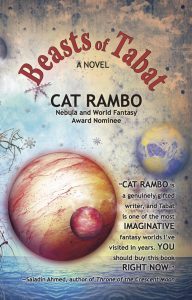Roundtable: Ian McDonald's Developing Economies Stories
Karen Burnham
Very interesting. Would anyone like to comment on how McDonald may have impacted the development of the field in the last few years? For instance, I feel like Paolo Bacigalupi is working profitably in fields that McDonald may have initially plowed. Any other examples, or were trends like this present anyway?
Paul Graham Raven
That’s a tricky question, and probably best answered by someone more widely read than myself! For my money, though, McDonald’s focus on the developing world as the frontier of change – social, technological, personal – still feels new, but in a very good way, and I definitely hope that more will follow from other writers. That said, what I’ve read of Bacigalupi’s work seems more like a working-out of the West’s burden of guilt and complicity in many of the developing world’s problems, which – while it’s something I’m pleased to see being published – feels qualitatively different to McDonald’s work, which attempts as earnestly as possible to see the developing world through its own eyes.
What would be even better would be an increased rate of publication in “the West” for writers native to the developing world; who could be better qualified to tell stories set there, after all? McDonald’s work has shown that there’s a definite hunger for the Global South as a setting for sf… though I wonder if the appeal of the exotic would be emphasised or reduced in the hands of a native writer? I suspect the best works would keep that magic; if China Mieville can make London seem a thing of wonder to those who live in it, then surely a writer from São Paolo or Mumbai is best equipped to bring those cities to life on the page?
The real question is, would we recognise the cities they painted for us?
Rachel Swirsky
How do you feel the literary world’s obsession with stories set outside the west, rendered often through westernized travel narratives, but not exclusively, might relate to this? I mean, I’ve long thought that exotification was a motivator, though probably not the only one. Is there a greater hunger for Amy Tan than Ngugi Wa Thiongo? I’m not sure? I think maybe they’re hungered for by different demographics?
I guess I’m not sure the culture in SF is that different in this regard from the culture in mainstream lit, so it seems like we might be able to find some answers there?
Paul Graham Raven
A very interesting point! But I’m woefully under-read in literary fiction, so I’d be very hesitant to leap to any conclusion based on what little of that field I know. Though it does chime interestingly with this defence of literary fiction (wherein all the attempts to show that litfic is not a genre merely confirm its status as such), which suggests the “start” of literary fiction could be traced back to Salman Rushdie’s Midnight’s Children, which is very much an exotic window onto a bygone former colony. Perhaps literary readers feel about exoticism the same way sf readers feel about sensawunda and/or cognitive estrangement? Potentially interesting line of enquiry…
Rachel Swirsky
Well, I wouldn’t call Rushdie exoticism. Although the experience of reading him, for some western readers, might be?
The literary readers I know seem to find “learning something new about the world” to be their sensawunda, which can include anything from “what is life like in X region” to “how does lobster fishing work?” One of my former literary teachers (who writes about life in X region) actually made this explicit when he was talking about how to write fiction. He said something like “readers love feeling like they’ve learned something, like they’ve gotten some nonfiction in their fiction” which I have basically found to be true.
I think an interesting point to explore is when the two genres overlap with sort of science writing… I know several literary fiction writers who want to write about, e.g., physics or astronomy but through a literary lens, and the work does look substantively different than SF, even literary-minded SF that treats the science fictional concept as metaphor, such as Vylar Kaftan’s “I’m Alive, I Love You, I’ll See You in Reno“.
Lou Anders
Stepping back just to say that Paolo had not read Ian prior to writing The Windup Girl. This may have changed, but was true at the time of Paolo’s initial acclaim. So I’d say Ian created a climate that was receptive to non-Western centric SF but was not a direct influence on Paolo’s writing.
Paul Graham Raven
Rachel: Well, I wouldn’t call Rushdie exoticism. Although the experience of reading him, for some western readers, might be?
Yeah, I was going more on reader perception, especially here in the UK. (Which, incidentally, seems to be developing an interesting resurgence of nostalgia for India as the former jewel in the crown, and a rose-tinted example of one of the things we didn’t get totally wrong (however undeserved that feeling actually is); given the Zeitgeist is full of waning empires right now, it’s not entirely surprising, especially given our very nostalgic national character.) I’m not a gospel death-of-the-author type, but I think you have to read a book’s vibe through it’s readership, especially when talking in these sort of general terms.
Lou: Stepping back just to say that Paolo had not read Ian prior to writing The Windup Girl.
Now that’s interesting, and a little surprising – though it lends a validity to the notion of the turn toward the developing world as more a Zeitgeist thing than a “movement” or chain of influences.
I’d say Ian created a climate that was receptive to non-Western centric SF.
Yes, definitely – and set the bar bloody high while he was at it, too.
Fabio Fernandes
Lou: Stepping back just to say that Paolo had not read Ian prior to writing The Windup Girl.
Paul: Now that’s interesting, and a little surprising – though it lends a validity to the notion of the turn toward the developing world as more a Zeitgeist thing than a “movement” or chain of influences.
I agree. I was pleasantly surprised with The Windup Girl, and even though I had never been to Thailand before, Paolo’s description of the country and the people seemed quite natural to me, without any exoticism. This interest beyond the borders of developed countries (especially when the writer manages to approach the subject of her/his
story using no stereotypes or clichés) is very refreshing.
I’d say Ian created a climate that was receptive to non-Western centric SF
Yes, definitely – and set the bar bloody high while he was at it, too.
Hell yeah! 
I would like to answer that, since you mentioned São Paulo. 
On the matter of recognition, that’s something I’ve been struggling with for quite some time now. I’m currently rewriting a novelette called “The Remaker”, which is set in São Paulo some couple of decades from now – the story deals with the death of written culture and the rise of artificial intelligence, and the city is not much of a character. I chose to emphasize things like fashion, means of transportation, coffee houses, things that are quite the same as in New York or London, actually. This story has already been submitted to several venues with no success so far, and I wonder if I should make some adjustments to the narrative or give to the city of São Paulo a more distinctive role? (Sorry if this has gone off-topic – I thought it was worth to share.)
Lou Anders
Both Paolo and Ian travel for long periods in the regions they plan to write about.
Fabio Fernandes
That was something I was trying to check but haven’t been able to, so far – do you happen to know how long Ian stayed in Brazil?
Lou Anders
I know he made several trips, but I don’t know the duration. I want to say that one of them was for a month, but am having trouble reconciling that with his dayjob in television.
Rachel Swirsky
Paolo’s book has actually gotten a lot of criticism for exoticism. I can’t really speak to that criticism–I thought he did a good job, but when informed people disagree, I’m loathe to say there’s no merit to their arguments when I don’t really have any experience to contradict them. (I do think some of the arguments are based on uncharitable [and in my view, unsupported] readings of this essay.)
I guess I’m just wondering, has McDonald been subject to similar criticisms? If not, is it because he’s writing with a different kind of lens? I’m curious about what that difference might be. Of course, it’s possible that the difference is that Paolo’s work has been in the spotlight a lot lately and McDonald’s may not have been.





(I do think some of the arguments are based on uncharitable [and in my view, unsupported] readings of this essay.)
Thanks for saying that, Rachel. I totally agree – although as to the gender politics (and I haven’t read The Windup Girl yet, just a lot of his short fiction), I’m not sure they still aren’t troubling.
And thanks to all for an interesting discussion of one of my favourite authors!
Pingback:Locus Online on Ian McDonald… | Zeno Literary Agency Ltd.
Very interesting discussion. I wish there’d have been time to explore this theme of “exoticism” (particularly from Fabio’s novella description of “the city is not much of a character in the story” and that the setting is more or less a more generic near future city rather than an attempt to confront the reader with “exotic” Sao Paolo). On the theme of “getting some non-fiction in my literary fiction” — I like this idea. Thanks for a good roundtable!
“Chaga” (aka “Evolution’s Shore”) is another, and earlier, Mcdonald novel, set mainly in Kenya. It’s really good, although perhaps the author’s style shows less streamlining than in “River of Gods”, and with a well-rounded main character.
Pingback:March 10, 2011 Links and Plugs : Hobbies and Rides